 W
WPetroleum politics have been an increasingly important aspect of diplomacy since the rise of the petroleum industry in the Middle East in the early 20th century. As competition continues for a vital resource, the strategic calculations of major and minor countries alike place prominent emphasis on the pumping, refining, transport, sale and use of petroleum products. However, international climate policy and unconventional oil and gas developments may change the balance of power between petroleum exporting and importing countries with major negative implications expected for the exporting states.
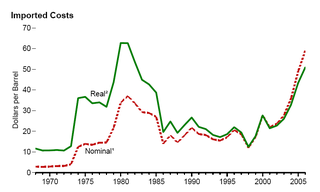 W
WThe 1970s energy crisis occurred when the Western world, particularly the United States, Canada, Western Europe, Australia, and New Zealand, faced substantial petroleum shortages, real and perceived, as well as elevated prices. The two worst crises of this period were the 1973 oil crisis and the 1979 energy crisis, when the Yom Kippur War and the Iranian Revolution triggered interruptions in Middle Eastern oil exports.
 W
WThe 1979 Oil Crisis, also known as the 1979 Oil Shock or Second Oil Crisis, was an energy crisis caused by a drop in oil production in the wake of the Iranian Revolution. Although the global oil supply only decreased by approximately four percent, the oil markets reaction raised the price of crude oil drastically over the next 12 months, more than doubling it to $39.50 per barrel. The spike in price caused fuel shortages and long lines at gas stations similar to the 1973 oil crisis.
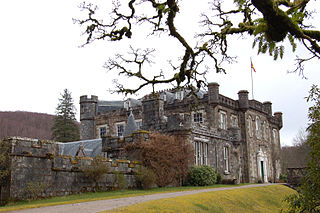 W
WAchnacarry is a small hamlet, private estate, and a castle in the Lochaber region of Highland, Scotland. It occupies a strategic position on an isthmus between Loch Lochy to the east, and Loch Arkaig to the west.
 W
WThe Age of Oil, also known as the Oil Age, the Petroleum Age, or the Oil Boom, refers to the era in human history characterised by an increased use of petroleum in products and as fuel. Though unrefined petroleum has been used for various purposes since ancient times, it was during the 19th century that refinement techniques were developed and gasoline engines were created.
 W
WUnited States foreign policy in the Middle East has its roots in the 18th century Barbary Wars in the first years of the United States of America's existence, but became much more expansive in the aftermath of World War II. American policy during the Cold War tried to prevent Soviet Union influence by supporting anti-communist regimes and backing Israel against Soviet-sponsored Arab countries. The U.S. also came to replace the United Kingdom as the main security patron of the Persian Gulf states in the 1960s and 1970s, to ensure a stable flow of Gulf oil. The U.S. has diplomatic relations with all countries in the Middle East except for Iran, whose 1979 revolution brought to power a staunchly anti-American regime.
 W
WThe Bureau of Energy Resources (ENR) is an agency in the United States Department of State that coordinates the department's efforts in promoting international energy security. The bureau is under the purview of the Under Secretary of State for Economic Growth, Energy, and the Environment.
 W
WCarless days were introduced by the Third National Government of New Zealand on 30 July 1979. The enabling legislation was one of several unsuccessful attempts to help the declining New Zealand economy after the oil shocks of the late 1970s—other such policies included the Think Big strategy.
 W
WRobert Francis Cekuta is a career Foreign Service Officer, and served as U.S. Ambassador to Azerbaijan from February 2015 through March 2018.
 W
WThe Emergency Petroleum Allocation Act of 1973 (EPAA) was a U.S. law that required the President to promulgate regulations to allocate and control price of petroleum products in response to the 1973 oil crisis.
 W
WThe Energy Policy and Conservation Act of 1975 (EPCA) is a United States Act of Congress that responded to the 1973 oil crisis by creating a comprehensive approach to federal energy policy. The primary goals of EPCA are to increase energy production and supply, reduce energy demand, provide energy efficiency, and give the executive branch additional powers to respond to disruptions in energy supply. Most notably, EPCA established the Strategic Petroleum Reserve, the Energy Conservation Program for Consumer Products, and Corporate Average Fuel Economy regulations.
 W
W"Fossil fuels lobby" is a term used to label the paid representatives of large fossil fuel and aviation corporations who attempt to influence governmental policy. Big Oil companies such as ExxonMobil, Royal Dutch Shell, BP, Total S.A., Chevron Corporation, and ConocoPhillips are among the largest corporations associated with the fossil fuels lobby.
 W
WThe fuel protests in the United Kingdom were a series of campaigns held because of the rising petrol and diesel fuel prices for road vehicle use. There have been three notable campaigns amongst many other protests in the 21st century. The first major protest in 2000 was primarily led by independent lorry owner-operators. One group of lorry owner-operators from the South East of England formed a protest group called "TransAction" that protested at oil refineries and fuel depots in Essex. Protests and blockades of oil facilities caused widespread disruption to the supply of petroleum products. The aim of the protests was to secure a reduction in the fuel duty rate on petrol and diesel, which the government refused to enact. After the protest ended, the government did announce a freeze on fuel duties, and promised changes would be made to the way that goods vehicles were taxed, which would include the taxing of foreign vehicles operating on British roads.
 W
WAmos J. Hochstein is a U.S. businessman, former diplomat, lobbyist, and national security and energy expert. He has worked in the U.S. Congress, has testified before congressional panels and has served in the Barack Obama administration under Secretaries of State Clinton and Kerry. He was appointed Deputy Assistant Secretary of State in 2011 and as Special Envoy and Coordinator for International Energy Affairs. In 2015, President Barack Obama nominated Hochstein to be the Assistant Secretary of State for Energy Resources but the Senate did not act on the nomination.
 W
WThe Hubbert peak theory says that for any given geographical area, from an individual oil-producing region to the planet as a whole, the rate of petroleum production tends to follow a bell-shaped curve. It is one of the primary theories on peak oil.
 W
WThe International Energy Agency is a Paris-based autonomous intergovernmental organisation established in the framework of the Organisation for Economic Co-operation and Development (OECD) in 1974 in the wake of the 1973 oil crisis. The IEA was initially dedicated to responding to physical disruptions in the supply of oil, as well as serving as an information source on statistics about the international oil market and other energy sectors.
 W
WAntonia Juhasz is an American oil and energy analyst, author, journalist and activist. She has authored three books: The Bush Agenda (2006), The Tyranny of Oil (2008), and Black Tide (2011).
 W
WIn 2005 the government of Sweden appointed a commission to draw up a comprehensive programme to reduce Sweden's dependence on petroleum, natural gas and other ‘fossil raw materials’ by 2020. In June 2006 the commission issued its report, entitled Making Sweden an Oil-Free Society. The report cited four reasons to reduce oil dependence:The impact of oil prices on Swedish economic growth and employment The link between oil, peace and security throughout the world The great potential to use Sweden's own clean renewable energy resources in place of oil The threat of climate change resulting from the extensive burning of fossil fuels
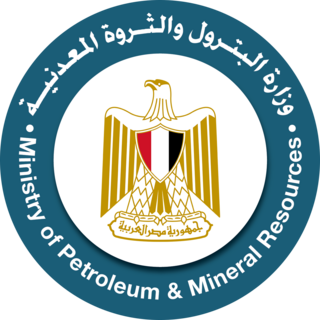 W
WThe first independent Ministry of Petroleum was established in March 1973, to manage the political role of petroleum resources before the war of 1973. In view of the strategic significance of the Ministry's existence as a political body that sets the general petroleum strategies on new bases to go in line with the requirements of the country at this stage. On top of its priority list, is to provide the local market needs of petroleum products, petrochemicals and mineral resources, and to contribute to achieving the targeted growth rates of the national economy.
 W
WThe mitigation of peak oil is the attempt to delay the date and minimize the social and economic effects of peak oil by reducing the consumption of and reliance on petroleum. By reducing petroleum consumption, mitigation efforts seek to favorably change the shape of the Hubbert curve, which is the graph of real oil production over time predicted by Hubbert peak theory. The peak of this curve is known as peak oil, and by changing the shape of the curve, the timing of the peak in oil production is affected. An analysis by the author of the Hirsch report showed that while the shape of the oil production curve can be affected by mitigation efforts, mitigation efforts are also affected by the shape of Hubbert curve.
 W
WThe Moral Equivalent of War speech was a speech in which US President Jimmy Carter addressed the people of the United States on April 18, 1977.
 W
WThe nationalization of the Iranian oil industry resulted from a movement in the Iranian parliament (Majlis) to seize control of Iran's oil industry, which had been run by private companies, largely controlled by foreign interests. The legislation was passed on March 15, 1951, and was verified by the Majlis on March 17, 1951. The legislation led to the nationalization of the Anglo-Persian Oil Company (AIOC). The movement was led by Mohammad Mosaddegh, a member of the Majlis for the National Front and future prime minister of Iran. The movement to nationalize the oil industry was the reaction to the following concessions made by Iran to foreign powers: the Reuter concession of 1872, proceeding letter,D'Arcy Concession?] the 1933 agreement between the Iranian government and AIOC, and the Gas-golshaian[?] contract. According to the political scientist Mark J. Gasiorowski, the oil nationalization movement had two major results: the establishment of a democratic government and the pursuit of Iranian national sovereignty.
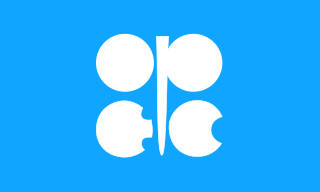 W
WThe Organization of the Petroleum Exporting Countries is an intergovernmental organization of 13 nations. Founded on 14 September 1960 in Baghdad by the first five members, it has since 1965 been headquartered in Vienna, Austria, although Austria is not an OPEC member state. As of September 2018, the 13 member countries accounted for an estimated 44 percent of global oil production and 81.5 percent of the world's "proven" oil reserves, giving OPEC a major influence on global oil prices that were previously determined by the so-called "Seven Sisters" grouping of multinational oil companies. A larger group called OPEC+ was formed in late 2016, to have more control on global crude oil market. The demand for OPEC oil has fallen to a 30-year low in second quarter of 2020.
 W
WThe Offshore and Onshore Reliability Data (OREDA) project was established in 1981 in cooperation with the Norwegian Petroleum Directorate. It is "one of the main reliability data sources for the oil and gas industry" and considered "a unique data source on failure rates, failure mode distribution and repair times for equipment used in the offshore industr[y]. OREDA's original objective was the collection of petroleum industry safety equipment reliability data. The current organization, as a cooperating group of several petroleum and natural gas companies, was established in 1983, and at the same time the scope of OREDA was extended to cover reliability data from a wide range of equipment used in oil and gas exploration and production (E&P). OREDA primarily covers offshore, subsea and topside equipment, but does also include some onshore E&P, and some downstream equipment as well.
 W
WPeak oil is the year when the maximum rate of extraction of petroleum is reached, after which it is expected to enter terminal decline. As of 2020, peak oil forecasts range from 2019 to the 2040s, depending on economics and how governments respond to global warming. It is often confused with oil depletion; however, whereas depletion refers to a period of falling reserves and supply, peak oil refers to the point of maximum production. The concept of peak oil is often credited to geologist M. King Hubbert whose 1956 paper first presented a formal theory. Peak coal was in 2013 and peak oil is forecast to occur before peak gas.
 W
WPetrocaribe is an oil alliance involving 18 Caribbean member states. The alliance was founded on 29 June 2005 in Puerto La Cruz, Venezuela, Venezuela offering the other member states oil supplies based on a concessionary financial agreement. Petrocaribe has been part of the "pink tide" in Latin America seeking to achieve post-neoliberal development in the region. In 2013 Petrocaribe established links with the Bolivarian Alliance for the Americas (ALBA) aiming to go beyond oil trade and promoting economic cooperation.
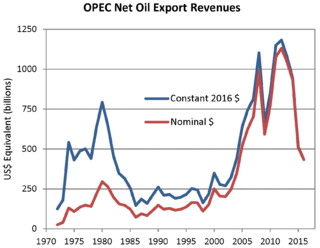 W
WPetrodollar recycling is the international spending or investment of a country's revenues from petroleum exports ("petrodollars"). It generally refers to the phenomenon of major petroleum-exporting nations, mainly the OPEC members plus Russia and Norway, earning more money from the export of crude oil than they could efficiently invest in their own economies. The resulting global interdependencies and financial flows, from oil producers back to oil consumers, can reach a scale of hundreds of billions of US dollars per year – including a wide range of transactions in a variety of currencies, some pegged to the US dollar and some not. These flows are heavily influenced by government-level decisions regarding international investment and aid, with important consequences for both global finance and petroleum politics. The phenomenon is most pronounced during periods when the price of oil is historically high.
 W
WThe Petroleum Safety Authority Norway is a Norwegian governmental supervisory authority under the Norwegian Ministry of Labour and Social Inclusion. The PSA has regulatory responsibility for safety, emergency preparedness and the working environment in petroleum-industry activities in Norway, both on land and offshore. The director is Magne Ognedal.
 W
WPeak oil is the point at which oil production, sometimes including unconventional oil sources, hits its maximum. Predicting the timing of peak oil involves estimation of future production from existing oil fields as well as future discoveries. The most influential production model is Hubbert peak theory, first proposed in the 1950s. The effect of peak oil on the world economy remains controversial.
 W
WThe Railroad Commission of Texas is the state agency that regulates the oil and gas industry, gas utilities, pipeline safety, safety in the liquefied petroleum gas industry, and surface coal and uranium mining. Despite its name, it ceased regulating railroads in 2005.
 W
WThe Red Line Agreement is an agreement signed by partners in the Iraq Petroleum Company (IPC) on July 31, 1928. The agreement was signed between Anglo-Persian Company, Royal Dutch/Shell, Compagnie Française des Pétroles, Near East Development Corporation and Calouste Gulbenkian. The aim of the agreement was to formalize the corporate structure of IPC and bind all partners to a "self-denial clause" that prohibited any of its shareholders from independently seeking oil interests in the ex-Ottoman territory. It marked the creation of an oil monopoly, or cartel, of immense influence, spanning a vast territory. The cartel preceded easily by three decades the birth of another cartel, the Organization of Petroleum Exporting Countries (OPEC), which was formed in 1960.
 W
WThe Russian Federation supplies a significant volume of fossil fuels and is the largest exporter of oil, natural gas and hard coal to the European Union. In 2017, energy products accounted around 60% of the EU's total imports from Russia. According to Eurostat, 30% of the EU's petroleum oil imports and 39% of total gas imports came from Russia in 2017. For Estonia, Poland, Slovakia and Finland, more than 75% of their imports of petroleum oils originated in Russia.
 W
WKenule Beeson "Ken" Saro-Wiwa was a Nigerian writer, television producer, environmental activist, and winner of the Right Livelihood Award for "exemplary courage in striving non-violently for civil, economic and environmental rights" and the Goldman Environmental Prize. Saro-Wiwa was a member of the Ogoni people, an ethnic minority in Nigeria whose homeland, Ogoniland, in the Niger Delta has been targeted for crude oil extraction since the 1950s and which has suffered extreme environmental damage from decades of indiscriminate petroleum waste dumping. Initially as spokesperson, and then as president, of the Movement for the Survival of the Ogoni People (MOSOP), Saro-Wiwa led a nonviolent campaign against environmental degradation of the land and waters of Ogoniland by the operations of the multinational petroleum industry, especially the Royal Dutch Shell company. He was also an outspoken critic of the Nigerian government, which he viewed as reluctant to enforce environmental regulations on the foreign petroleum companies operating in the area.
 W
WThe South Thailand insurgency is an ongoing conflict centered in southern Thailand. It originated in 1948 as an ethnic and religious separatist insurgency in the historical Malay Patani Region, made up of the three southernmost provinces of Thailand and parts of a fourth, but has become more complex and increasingly violent since the early 2000s from drug cartels, oil smuggling networks, and sometimes pirate raids.
 W
WSyriana is a 2005 American geopolitical thriller film written and directed by Stephen Gaghan, and executive produced by George Clooney, who also stars in the film with an ensemble cast. Gaghan's screenplay is loosely adapted from ex CIA operative Robert Baer's memoir See No Evil. The film focuses on petroleum politics and the global influence of the oil industry, whose political, economic, legal, and social effects are experienced by a Central Intelligence Agency operative, an energy analyst, a Washington, D.C., attorney, and a young unemployed Pakistani migrant worker in an Arab state in the Persian Gulf. The film also features an extensive supporting cast including Amanda Peet, Tim Blake Nelson, Mark Strong, Alexander Siddig, Amr Waked, and Academy Award winners Christopher Plummer, Chris Cooper and William Hurt.
 W
WRex Wayne Tillerson is an American engineer and energy executive who served as the 69th United States Secretary of State from February 1, 2017, to March 31, 2018, under President Donald Trump. Prior to joining the Trump administration, Tillerson was chairman and chief executive officer of ExxonMobil, holding that position from 2006 until 2017.
 W
WWinning the Oil Endgame: Innovation for Profits, Jobs and Security is a 2005 book by Amory B. Lovins, E. Kyle Datta, Odd-Even Bustnes, Jonathan G. Koomey, and Nathan J. Glasgow, published by the Rocky Mountain Institute. It presents an independent, transdisciplinary analysis of four ways to reduce petroleum dependence in the United States:Using oil more efficiently, through smarter technologies that wring more services from less oil (pp. 29–102). Substituting for petroleum fuels other liquids made from biomass or wastes (pp. 103–111). Substituting saved natural gas for oil in uses where they’re interchangeable, such as furnaces and boilers (pp. 111–122). Replacing oil with hydrogen made from non-oil resources (pp. 228–242).
 W
WWomen have been involved in the yellow vests movement since its inception. This is a result of women on the whole being more affected by poverty in France than their male counterparts, in part because many are heads-of-household and need to take time off from paid employment to give birth to children. Their role is greater than most past social movements in France because of the economically precarious position that many women in the country find themselves in.
 W
WThe yellow vests movement or yellow jackets movement is a populist, grassroots protest movement for economic justice that began in France in October 2018. After an online petition posted in May had attracted nearly a million signatures, mass demonstrations began on 17 November. The movement was initially motivated by rising fuel prices and a high cost of living; it claims that a disproportionate burden of the government's tax reforms were falling on the working and middle classes, especially in rural and peri-urban areas. The protesters have called for lower fuel taxes, a reintroduction of the solidarity tax on wealth, a minimum-wage increase, the implementation of Citizens' initiative referendums, among other things. On 29 November 2018, a list of 42 demands was made public and went viral on social media, becoming de facto a structuring basis for the movement, covering a wide range of eclectic topics, mostly related to democracy, social and fiscal justice.